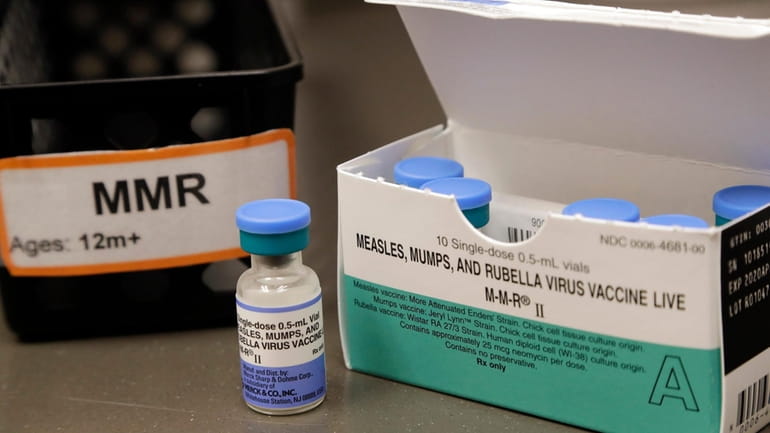We should take Nassau's measles case seriously

Long Island’s low rates for the measles, mumps and rubella vaccine have a very real impact. Credit: AP/Elaine Thompson
The case of a young Nassau County child diagnosed with the measles isn't necessarily a cause for alarm. Yet it highlights a broader public health concern: the continued pushback against vaccination and disturbingly low vaccination rates among Long Island's youngest children.
There's a lot we still don't know about the Nassau case. The child, who is under 5 years old, was not vaccinated, and may have exposed anyone who was at Cohen Children's Medical Center's emergency department over a 21-hour period beginning March 21. We don't know how the child got sick, why the child wasn't vaccinated, and who else may have been infected.
What we do know about Long Island's ongoing misguided and troubling anti-vaccination trend and its impact on our youngest residents is enough to worry anyone. Just 80.9% of Nassau children have received a single dose of the measles, mumps, and rubella vaccine by the age of 2. In Suffolk, 82.1% of those young children received their first MMR vaccine dose. In other words: One in five of Long Island's youngest children aren't vaccinated. That puts everyone who's unvaccinated — including those who are immunocompromised or otherwise can't be vaccinated — and those older folks whose vaccine protection is waning at risk. To protect the community, medical experts say, that percentage should be at least 95%.
Alarm bells should be ringing.
Such low vaccination rates have a very real impact. There have been 64 measles cases diagnosed in the U.S. so far in 2024. There were 58 cases all of last year. Statewide, there have been three New York City cases this year, in addition to the Nassau case.
Measles is extraordinarily contagious for anyone who's not vaccinated. And while many healthy individuals recover fully, measles can cause serious complications among the very young and old and those who are immunocompromised. The only protection is the MMR vaccine, which for 50 years has proved safe and effective.
The state Health Department is taking this seriously, as it should. Department officials are doing wastewater testing in the area and those results will show how much the measles has spread — and where. State officials also must analyze the broader public health issues at work, including what's behind the low vaccination rates. What's the role of misinformation, disinformation and the anti-vaccination movement especially prevalent on Long Island, a movement that began before the COVID-19 pandemic but has gained ground since? What about vaccine access, availability and education? What other factors are at work?
Both Nassau and Suffolk must treat this issue with urgency. An immediate push to vaccinate Long Island's youngest residents, by educating parents, providing free vaccination opportunities and issuing strong public health messaging, is critical. So is vaccinating older children and checking our own levels as adults.
Vaccines are the way society stops preventable diseases from spreading. We have an obligation to protect ourselves, our children, and our neighbors.
MEMBERS OF THE EDITORIAL BOARD are experienced journalists who offer reasoned opinions, based on facts, to encourage informed debate about the issues facing our community.
